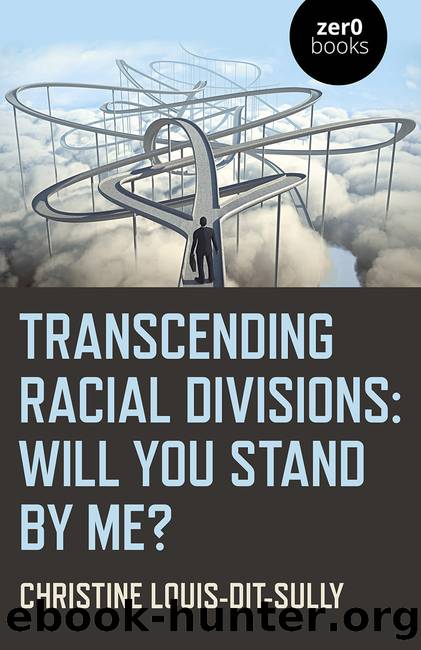Transcending Racial Divisions by Christine Louis-Dit-Sully

Author:Christine Louis-Dit-Sully
Language: eng
Format: epub
Publisher: John Hunt Publishing
Published: 2021-03-26T00:00:00+00:00
Separated by cultures
UNESCO had a big influence in the popularization of the idea that cultures were the main forces that determine and shape human beings. The promotion of cultural relativism, originally developed by Boas and his students but further developed by others such as structuralist Claude Lévi-Strauss, popularized the notion that humanity is separated into numerous cultures that can only be understood using norms, ideas, values and concepts found within each of these cultures. No hierarchy between cultures is possible because they cannot be judged with universal human notions. Boas had developed his concept of culture as a challenge to racial hierarchy and racism and had promoted the notion of equality. Human beings are shaped and molded by their specific cultures without any possibilities for them to reason and change. Reason, the basis for our autonomy and moral conscience, is denied with a vision of human beings as simple representations or owners of specific cultures. The anti-human sentiment and anti-humanist attitude are found both in cultural relativism and racial thinking.
For these reasons, I think multiculturalism and diversity policies need to be opposed. Unfortunately, the distinction between multiculturalism and diversity as facts of life and as lived experiences and, multiculturalism and diversity as policies is often completely blurred. This blurring can then lead to arguments denouncing the presence of too many people of different cultural backgrounds. Not wanting to have too many Chinese people in your home town or wanting to restrict the Muslim population in a specific area are obviously racist or xenophobic opinions. Rejecting others because of their various backgrounds, these opinions express an opposition to human diversity as a lived experience, as a fact of life. In fact, this is often argued on the grounds of protecting oneâs culture or the interests of oneâs race. Those who argued this are the mirror image of the supporters of multiculturalism and diversity policies. Multiculturalism is about protecting cultures; these cultures are grasped as if they are out of the control of the human beings currently alive and simply imposed upon them. Culture, in these cases, is no more the way people have decided to live today. It is not the norms, habits, traditions, ideas, beliefs and ways of life they want to keep but the norms, traditions and ways of life given to them by their ancestors. They are portrayed as custodians of culture developed by ancestors. The resulting effect is fixed cultures, prevented from changing by policies and self-proclaimed cultural gatekeepers. American culture, for example, with this definition, is not what people in the United States do, the norms, values, and habits they have decided to adopt today but a fixed culture of the past people are supposed to follow and preserve.
In the next chapter, I will briefly look at identity and identity politics. The contemporary focus on identity is due to the change in the cultural and intellectual perceptions of the individual. It is because of the continuous role and importance of politicized identities in society. I will
Download
This site does not store any files on its server. We only index and link to content provided by other sites. Please contact the content providers to delete copyright contents if any and email us, we'll remove relevant links or contents immediately.
| Africa | Americas |
| Arctic & Antarctica | Asia |
| Australia & Oceania | Europe |
| Middle East | Russia |
| United States | World |
| Ancient Civilizations | Military |
| Historical Study & Educational Resources |
The Bomber Mafia by Malcolm Gladwell(1183)
Submerged Prehistory by Benjamin Jonathan; & Clive Bonsall & Catriona Pickard & Anders Fischer(1162)
Facing the Mountain by Daniel James Brown(1135)
The Dawn of Everything by David Graeber & David Wengrow(1111)
The Way of Fire and Ice: The Living Tradition of Norse Paganism by Ryan Smith(1033)
Wandering in Strange Lands by Morgan Jerkins(1018)
Driving While Brown: Sheriff Joe Arpaio Versus the Latino Resistance by Terry Greene Sterling & Jude Joffe-Block(1003)
Tip Top by Bill James(1002)
Evil Geniuses: The Unmaking of America: A Recent History by Kurt Andersen(1001)
Red Roulette : An Insider's Story of Wealth, Power, Corruption, and Vengeance in Today's China (9781982156176) by Shum Desmond(1000)
F*cking History by The Captain(969)
It Was All a Lie by Stuart Stevens;(941)
White House Inc. by Dan Alexander(905)
Evil Geniuses by Kurt Andersen(903)
Treasure Islands: Tax Havens and the Men who Stole the World by Nicholas Shaxson(880)
American Dreams by Unknown(859)
American Kompromat by Craig Unger(849)
The Fifteen Biggest Lies about the Economy: And Everything Else the Right Doesn't Want You to Know about Taxes, Jobs, and Corporate America by Joshua Holland(816)
The First Conspiracy by Brad Meltzer & Josh Mensch(812)
